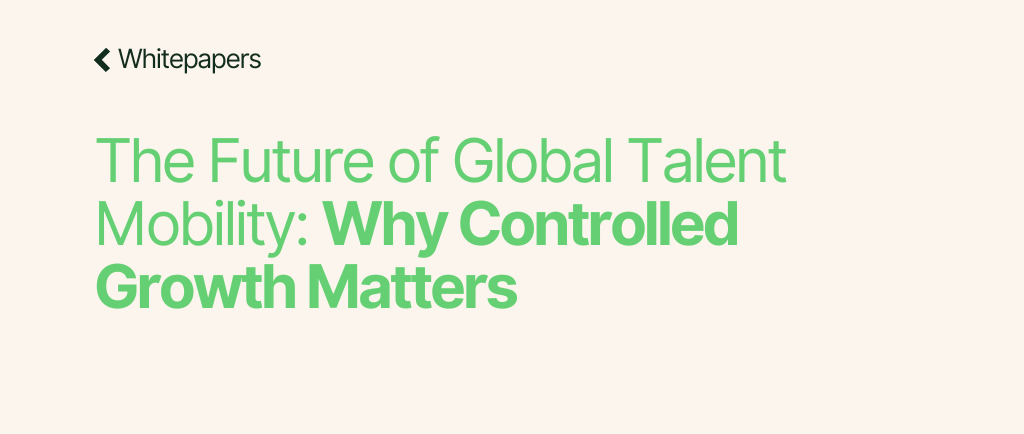The Future of Global Talent Mobility: Why Controlled Growth Matters
Global talent mobility is reshaping the future of work and education. But how can we balance opportunity with sustainability? In this article, our founder explores why controlled growth matters, what we can learn from the U.S. and the Netherlands, and how Ekspats’ Career Ecosystem builds smarter, fairer pathways for talent worldwide. Read the full article to discover the vision behind the future of mobility.
WHITEPAPERS
Tuncay Cerit
9/30/20252 min read


The Future of Global Talent Mobility: Why Controlled Growth Matters
Global talent mobility has accelerated dramatically over the past decade. Students, professionals, and entire industries are crossing borders at an unprecedented scale. For businesses, universities, and governments, this trend represents both immense opportunities and complex challenges.
The critical question is not whether global talent mobility will continue, it will. The question is how we manage it. Because without controlled growth, mobility risks becoming unsustainable.
The Current Landscape
Across Europe, the U.S., and Asia, employers are grappling with critical skill shortages in technology, healthcare, engineering, and beyond. At the same time, international student migration is at record highs, and thousands of graduates are seeking opportunities abroad.
Yet, policy frameworks and employer practices often fail to align talent supply with market demand. Some systems are too restrictive, pushing talent away. Others are too open, creating integration challenges and imbalances. Controlled growth is about striking the right balance.
Why Controlled Growth Matters
Unstructured expansion in talent mobility leads to predictable risks:
Brain drain, where developing countries lose their best talent permanently.
Market imbalances, where some industries are oversupplied while others face chronic shortages.
Integration challenges, where societies struggle to support newcomers in language, housing, and culture.
Controlled growth ensures that talent mobility is not just about numbers, but about quality, sustainability, and alignment.
A Tale of Two Models: U.S. vs. Netherlands
When we talk about controlled growth, the contrast between the United States and the Netherlands is striking.
In the U.S., sweeping reforms to the H-1B visa program, including proposals for a $100,000 application fee and a shift toward salary-based selection are making it increasingly difficult for companies to access international talent. While the intention is to prioritize highly paid, highly skilled roles, the risk is clear: turning away the very innovators who drive growth and competitiveness.
The Netherlands, by contrast, applies a more measured approach. Through its Highly Skilled Migrant program, only recognized employers can sponsor talent, minimum salary thresholds ensure quality, and integration laws require newcomers to learn Dutch and engage in society. This model balances openness with accountability slower in pace, but far more sustainable in outcome.
Together, these two approaches highlight the importance of controlled growth. Excessive restriction can stifle innovation. Excessive openness can overwhelm systems. The balance is what ensures long-term success.
The Ekspats Perspective
At Ekspats, we believe controlled growth is best achieved through a Career Ecosystem approach:
With EnglishTunes, we help students enter the right universities, with the right scholarships, setting the foundation for success.
With Ekspats, we connect graduates with global companies, ensuring their talent is not lost but fully realized.
With Spark AI, we bring technology and intelligence to the process making recruitment faster, smarter, and more inclusive.
This ecosystem is about more than mobility. It’s about alignment between education, employment, and opportunity.
Conclusion
The future of global talent mobility will not be defined by how fast we can move people across borders. It will be defined by how well we can manage that movement.
Controlled growth is not a limitation; it is a strategy for sustainability. It ensures that mobility creates innovation, competitiveness, and inclusive growth, not instability.
At Ekspats, this belief is at the heart of our mission: to make global talent mobility smarter, fairer, and better aligned with the needs of tomorrow.

